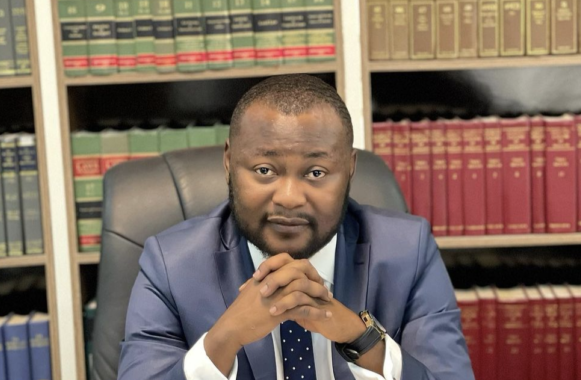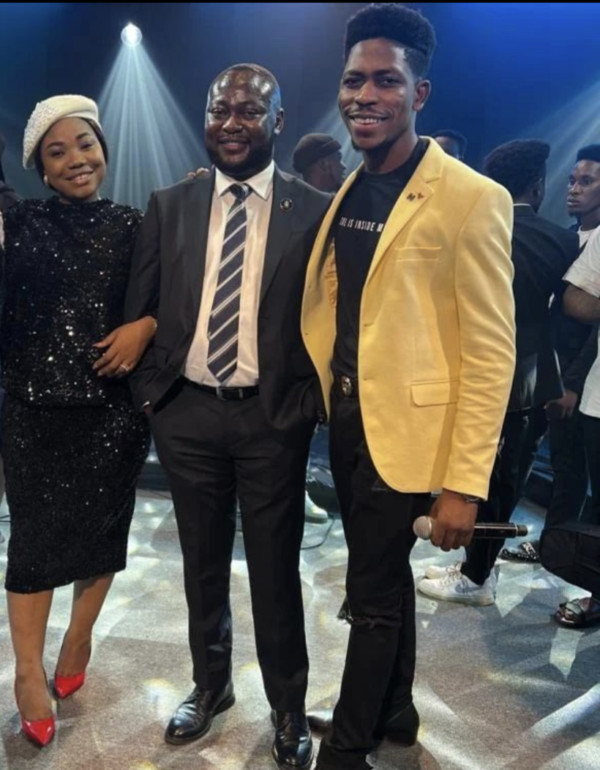Pelumi Jacob Olajengbesi is an Abuja-based lawyer, columnist, human rights activist and arbitrator. He is the co-founder of Law Corridor, a legal firm that provides services to notable people including celebrities like D’banj, Moses Bliss, and Mercy Chinwo among others. The lawyer draws inspiration from his passion to fight for a just society. In this interview with TheCable Lifestyle, Olajengbesi talks about his experience in entertainment law, handling social media trolls, and the Nigerian justice system.
TheCable Lifestyle: Why did you choose the legal profession?
Pelumi Olajengbesi: I was born into a family that is not so privileged in society. I have disdain for oppressive people. I studied law because I believe law is a platform where you can engage people who feel they are very powerful. Where you can challenge power and seek justice for people.
TheCable Lifestyle: You represent artistes like Moses Bliss, Mercy Chinwo, and D’banj. What sets you apart as an entertainment lawyer from other legal practitioners?

Pelumi Olajengbesi: We have very few lawyers in the law field who understand the business of entertainment law. I think what has made me different or our firm is that we have constantly improved in terms of engagement with clients. In terms of providing services for them and in terms of engaging clients in areas, they ought to. I have clients beyond the people you mentioned. Some of the people you know are probably because we have one or two things to do together in public. I have been representing Moses Bliss, Mercy Chinwo for a while and so many other people within the gospel space and the circular music.
I think what is essential is that our firm has the experience, and the capacity to drive home and provide the required services. There are a lot of lawyers generally in the country. They have different knowledge about different areas of law. The entertainment law is an aspect of the law that you need to have proper knowledge about. Essentially it is not just about contract alone. Because when you are doing contracts you need to understand the requisite terminologies. You need to engage properly. So, when you have a client now who wants to claim a certain royalty or revenue from his publishing, you need to know what to do. You need to know how to go about it. For me, entertainment law is not my thing. I was actually trained as a criminal defence attorney. I do criminal defence and I know a lot about human rights. But we have a very big firm. We have a team of lawyers about 11 who are into intellectual property.
For example, I am not the one providing services to Mr Moses Bliss in the firm. We have a young lady who is very savvy. She is currently on a course in Turkey. I am not the one representing D’banj per se in the firm. But my name is there because I am the managing partner. I am probably closer to them in the public domain. What sets us apart is simply because we have the experience.
TheCable Lifestyle: How do you deal with trolls who attack your clients online?
Pelumi Olajengbesi: We are very lucky. We have 52 clients within the entertainment sector. So you will see them run into crises, get disturbed by social media bullies, and all of that. You know social media is freedom of speech. The expression thing. People just want to come online and just say anything. And some of these things are against the law. When you are in this kind of space, especially those in the entertainment sector, they already understand that they have their identities as human beings and they also have their brand. Their brand is different from their real person. You will get to some level, you need to outgrow your person. Understand the concept of the brand.
Sometimes I see some people out there. What their brand is to people is not who they are. So when you say something about them in the press that is very disturbing, they do not even see it or check it. But whenever what the person is saying affects their integrity, at times we engage or we just let it go.
For example, people in the gospel are extremely careful about engaging people in the social media space because there is a level of expectation from them from people in the society. They are Christians and they are supposed to be role models for Christians. They should not be saying or doing certain things. They should be seen to be meek. They should be seen to be forgiven. So when things happen that tend to affect them personally, they will just pray about it and after some time overlook it.
Social media today is not something you can control. We can not also trust people in positions of authority to make laws to regulate social media. The reason is that the intention oftentimes is to make laws that suppress and oppress genuine freedom of the press. So you cannot actually be campaigning because you will be empowering those in authority that can actually affect the wellbeing and the democratic tenets and capacity of people to hear their complaints and opinions. So, what I think is, if there are laws in place to checkmate those that have committed an offence, such people should be taken up. But we cannot actually shut down social media. We should consider the positives. It is better.

For example, recently some people came out and said a child belongs to another person. Some of these people apologised in public and some reached out privately. And because these gospel artistes are Christians and the goal is heaven. The public expects them to accept their apology.
TheCable Lifestyle: Can you list five things you cannot do without?
Pelumi Olajengbesi: I cannot do without music. I love music a lot. My life is not complete without music. Another thing I cannot do without is my work. I am so committed to Law Corridor.
TheCable Lifestyle: Where do you see yourself in the next 10 years?
Pelumi Olajengbesi: I see myself in a place where I can supply the voice and the vision for the genuine emancipation of the people. In the next three years, I should be at the top of my practice. I would have gotten the very respectful level as SAN. I am sure I am going to be in politics. I know I will be in politics.
TheCable Lifestyle: What is your opinion about the Nigerian justice system?
Pelumi Olajengbesi: The Nigerian justice system is improving every day. So we cannot actually separate Nigerian society from the Nigerian justice system. The men and women on the bench respectively are products of society. I must tell you that we are not there yet, but the justice system is improving. We can do more to make it better.
TheCable Lifestyle: What can you say about the naira abuse law being strongly enforced recently?

Pelumi Olajengbesi: That law is repugnant to natural justice. It is repugnant to our cultural values. The law cannot stand the test of time. Under the sociological school of thought, it is of the opinion that any law that we make must conform to the cultural values of the people. So that people will not go against the law. When you have a law that people cannot comply with then it is a problem. If you look at what played out in Bobrisky’s matter, a lot of people were insinuating that some people wanted to punish him/her. I feel like that was not the case. The case is about the court.
If you look at the law stipulated on the naira abuse, I think there should be a way around it. Because of course, the proponent of naira mutilation also believes that naira itself is part of our symbol, our identity, and that should not be disrespected. If you go to the United States people spray dollars. It is part of the things they can protect by right. In Nigeria, what belongs to you is the value of the naira, not the naira itself. When you abuse the naira note, you can probably be jailed. Something should be done about that law. Naira mutilation can be well-defined. If you look at that law again, it has been putting some people out of business. Even in Africa, a lot of people organise events because they want to make money from whatever you spray them at parties. But then, because the government of the day is trying to have an aggressive valuation of naira, trying to give the naira some kind of regard, and respect. We should encourage them.
Copyright 2024 TheCable. All rights reserved. This material, and other digital content on this website, may not be reproduced, published, broadcast, rewritten or redistributed in whole or in part without prior express written permission from TheCable.
Follow us on twitter @Thecablestyle

